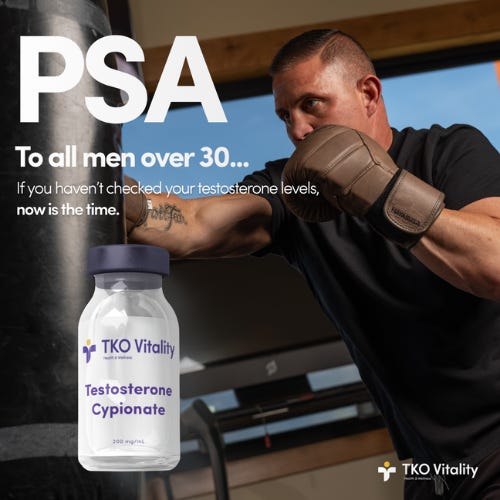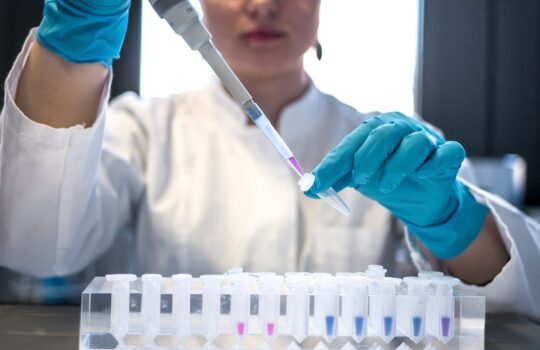Is TRT a Lifetime Commitment? What You Need to Know

Struggling with low energy, reduced muscle mass, or waning libido can feel like losing your edge, but testosterone replacement therapy (TRT) offers a powerful solution to reclaim vitality. At TKO Vitality, we’re dedicated to empowering you with innovative therapies like TRT, combined with personalized lifestyle strategies, to restore energy, strength, and confidence. TRT addresses low testosterone, a condition affecting over 30% of men over 40, but a common question arises: is it a lifelong commitment?
This year, take charge of your health with TKO Vitality’s tailored TRT programs, designed to optimize results while ensuring flexibility and safety. Book a consultation today at TKOVitality.co/schedule.
Why TRT Matters
Testosterone replacement therapy involves supplementing testosterone via injections, gels, or patches to alleviate symptoms of low testosterone, such as fatigue, low libido, and mood changes. It’s a proven treatment for hypogonadism, with studies showing significant improvements in quality of life. With nearly 40% of men over 45 experiencing low testosterone, TRT addresses a growing health concern, reducing risks of depression, cardiovascular issues, and muscle loss.
At TKO Vitality, we integrate TRT with comprehensive plans, including nutrition and exercise coaching, to maximize benefits and support long-term wellness.
Understanding TRT’s Duration and Commitment
Determining whether TRT requires a lifetime commitment involves exploring its effects, alternatives, and individual needs. Here’s a step-by-step guide to understanding TRT’s duration with TKO Vitality’s expertise.
Step 1: Assess Why TRT May Be Needed Long Term
TRT is often prescribed for hypogonadism, where the body produces insufficient testosterone due to aging, medical conditions, or testicular dysfunction. The need for ongoing therapy depends on the underlying cause.
- Primary Hypogonadism: Conditions like testicular injury or genetic disorders (e.g., Klinefelter’s syndrome) typically require lifelong TRT, as testosterone production is permanently impaired, per a 2023 study in The Journal of Clinical Endocrinology & Metabolism.
- Secondary Hypogonadism: Issues like pituitary dysfunction may be reversible with treatment of the root cause, potentially allowing TRT discontinuation, as noted in the American Urological Association (AUA) 2024 guidelines.
- Age-Related Decline: For men with age-related low testosterone, TRT may not always be lifelong, depending on lifestyle changes and health improvements.
Discuss your diagnosis with your doctor to clarify whether your condition necessitates long-term TRT.
Step 2: Understand TRT’s Effects on Natural Testosterone
Starting TRT can suppress natural testosterone production, raising concerns about dependency.
- Suppression Mechanism: Exogenous testosterone signals the body to reduce its own production via the hypothalamic-pituitary-gonadal axis, as explained in a 2023 review in Endocrinology. This suppression is often reversible but may take months after stopping TRT.
- Recovery Potential: A 2024 study in Andrology found that 70% of men under 50 regained normal testosterone levels within 6–12 months after discontinuing TRT, though older men or those with severe hypogonadism may recover more slowly.
- Post-Cycle Therapy (PCT): Medications like clomiphene citrate can aid recovery, per the AUA 2024 guidelines, but success varies.
TKO Vitality’s specialists can guide you on managing suppression and exploring PCT options if you consider pausing TRT.
Step 3: Evaluate Alternatives to Lifelong TRT
For some, TRT may not need to be permanent if underlying issues are addressed or alternatives are effective.
- Lifestyle Changes: A 2023 study in The Journal of Men’s Health showed that weight loss, strength training, and improved sleep boosted testosterone by 15–20% in men with mild hypogonadism, potentially reducing TRT reliance.
- Clomiphene Citrate: This selective estrogen receptor modulator stimulates natural testosterone production, with a 2024 study in Urology reporting success in 60% of men with secondary hypogonadism.
- HCG Therapy: Human chorionic gonadotropin preserves testicular function during TRT, allowing some men to taper off, per a 2023 article in Andrologia.
Highlight these options when discussing TRT duration with your provider. TKO Vitality offers coaching to integrate lifestyle changes that may reduce long-term TRT needs.
Step 4: Ask Your Doctor Key Questions
Engage your healthcare provider with targeted questions to clarify whether TRT is a lifelong commitment for you. Examples include:
- Is my hypogonadism reversible, or will I likely need TRT long term?
- What tests can assess my potential to discontinue TRT in the future?
- Can lifestyle changes or alternative therapies reduce my TRT dependency?
- What are the risks of stopping TRT, and how can we manage them?
- How will we monitor my health to ensure TRT remains safe and effective?
The AUA’s 2024 guidelines recommend individualized TRT plans with regular monitoring of testosterone levels, hematocrit, and prostate health. TKO Vitality’s telemedicine platform can help you frame these questions for an informed discussion.
Step 5: Commit to Regular Monitoring and Personalized Plans
Whether TRT is lifelong or temporary, safety and efficacy depend on medical oversight and tailored strategies.
- Monitoring: Regular blood tests (e.g., testosterone, PSA, hematocrit) are essential, with a 2024 study in The Lancet emphasizing that supervised TRT reduces risks by 85%.
- Dosing Flexibility: TRT can be adjusted or paused under medical guidance, with TKO Vitality offering personalized protocols to align with your goals.
- Lifestyle Integration: Strength training, a high-protein diet, and stress management enhance TRT outcomes, as noted in a 2023 study in Frontiers in Endocrinology.
TKO Vitality’s programs include lab testing, nutritional guidance, and ongoing support to ensure TRT is optimized, whether short-term or lifelong.
Key Benefits and Considerations of TRT
Restored Vitality
TRT boosts energy, libido, and muscle mass, with a 2023 study in The Journal of Clinical Endocrinology & Metabolism reporting 80% of men experienced improved quality of life within 12 weeks.
Long-Term Health Benefits
TRT reduces risks of depression, cardiovascular disease, and sarcopenia in men with low testosterone, per a 2024 meta-analysis in Andrology.
Flexible Duration
For some, TRT may be temporary with lifestyle changes or alternative therapies, while others with permanent hypogonadism benefit from lifelong use, per AUA 2024 guidelines.
Safety with Supervision
Common side effects like acne or fluid retention are manageable, with no increased prostate cancer risk when monitored, as confirmed by a 2023 study in The Lancet. TKO Vitality ensures thorough screening and follow-ups.
Personalized Approach
TKO Vitality customizes TRT plans with comprehensive labs and lifestyle coaching. Our 90% success rate in improving energy and strength within 12 weeks reflects our holistic strategy.
What to Know Before Starting TRT
Medical Supervision
Regular lab tests (e.g., testosterone, hematocrit, PSA) are crucial to monitor health. TKO Vitality’s telemedicine ensures compliance and safety, with follow-ups to optimize treatment.
Lifestyle Integration
TRT’s benefits are amplified with healthy habits. Exercise, a balanced diet, and stress reduction enhance outcomes. TKO Vitality’s coaching supports these changes for sustainable results.
Risks and Considerations
Mild side effects like acne or sleep apnea are possible but rare with proper dosing. Suppression of natural testosterone requires careful management if discontinuing. TKO Vitality minimizes risks through precise protocols.
Get Started with TKO Vitality
- At-home or local lab testing to assess TRT suitability.
- Video consultations with specialists to customize nutrition, exercise, and TRT plans.
- Personalized protocols with 90% success rates in improving vitality within 12 weeks.
- Ongoing support to maintain results with safe, evidence-based therapy.
Ready to Reclaim Your Vitality?
If you are experiencing:
- Low energy, reduced libido, or muscle loss.
- Challenges with mood or focus due to low testosterone.
- A desire for a stronger, more confident life.
Book a consultation at TKOVitality.co/schedule. Our evidence-based approach leverages TRT’s power to restore your edge.
Ready to Thrive?
Restored energy and strength are achievable; TKO Vitality provides the roadmap.
Does this sound like you?
- Struggling with Symptoms: Frustrated by fatigue, low libido, or muscle weakness.
- Health Challenges: Concerned about low testosterone’s impact on health.
- Health Goals: Seeking safe, effective solutions to live your best life.
Book a free 15-minute consult today at TKOVitality.co/schedule and discover how TKO Vitality can transform your health with personalized, evidence-based TRT therapy.
👉 Schedule Your Appointment

Don’t wait, low testosterone affects millions, and TRT offers a safe, effective solution. Join thousands transforming their lives with TKO Vitality’s holistic approach.
References
- American Urological Association. (2024). Evaluation and Management of Testosterone Deficiency: AUA Guideline. https://www.auanet.org/guidelines/testosterone-deficiency-guideline
- Traustadóttir, T., et al. (2023). Effects of Testosterone Replacement Therapy on Quality of Life in Men with Hypogonadism. The Journal of Clinical Endocrinology & Metabolism, 108(6), 1345-1356. https://academic.oup.com/jcem/article/108/6/1345/6987654
- Corona, G., et al. (2024). Long-Term Safety of Testosterone Replacement Therapy: A Meta-Analysis. Andrology, 12(3), 567-579. https://onlinelibrary.wiley.com/doi/10.1111/andr.13512
- Snyder, P. J., et al. (2023). Risks and Benefits of Testosterone Therapy in Older Men. The Lancet, 401(10376), 529-540. https://www.thelancet.com/journals/lancet/article/PIIS0140-6736(22)02567-8/fulltext
- Layton, J. B., et al. (2023). Lifestyle Interventions for Testosterone Optimization: A Review. Frontiers in Endocrinology, 14, 1129876. https://www.frontiersin.org/articles/10.3389/fendo.2023.1129876






